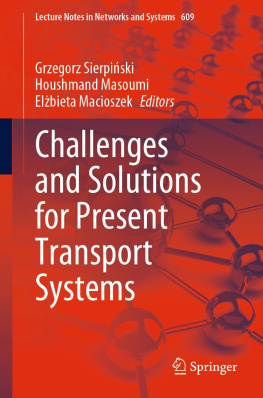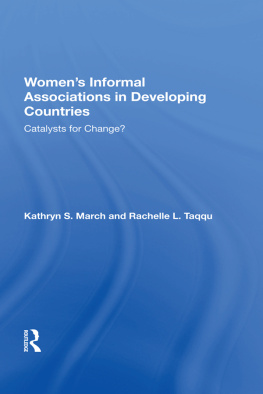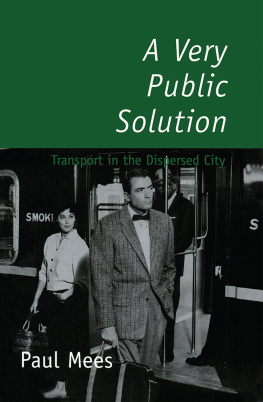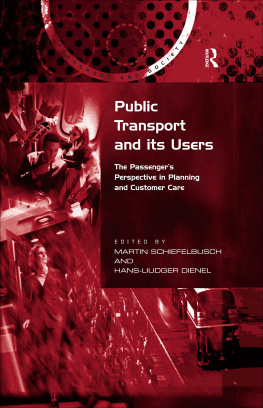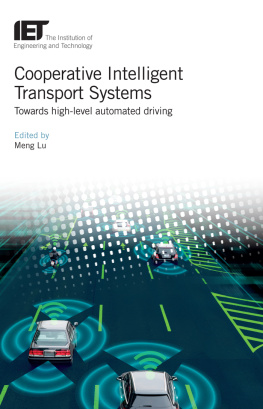INFORMAL PUBLIC TRANSPORT IN PRACTICE
Informal Public Transport in Practice
Matatu Entrepreneurship
MELECKIDZEDECK KHAYESI
Transport Researcher, Geneva, Switzerland
FREDRICK MUYIA NAFUKHO
Texas A&M University, USA
JOYCE KEMUMA
Dalarna University, Sweden
First published 2015 by Ashgate Publishing
Published 2016 by Routledge
2 Park Square, Milton Park, Abingdon, Oxon OX14 4RN
711 Third Avenue, New York, NY 10017, USA
Routledge is an imprint of the Taylor & Francis Group, an informa business
Copyright Meleckidzedeck Khayesi, Fredrick Muyia Nafukho and Joyce Kemuma 2015
Meleckidzedeck Khayesi, Fredrick Muyia Nafukho and Joyce Kemuma have asserted their right under the Copyright, Designs and Patents Act, 1988, to be identified as the authors of this work.
All rights reserved. No part of this book may be reprinted or reproduced or utilised in any form or by any electronic, mechanical, or other means, now known or hereafter invented, including photocopying and recording, or in any information storage or retrieval system, without permission in writing from the publishers.
Notice:
Product or corporate names may be trademarks or registered trademarks, and are used only for identification and explanation without intent to infringe.
British Library Cataloguing in Publication Data
A catalogue record for this book is available from the British Library
The Library of Congress has cataloged the printed edition as follows:
Khayesi, Meleckidzedeck.
Informal public transport in practice : matatu entrepreneurship / by Meleckidzedeck Khayesi, Fredrick Muyia Nafukho and Joyce Kemuma.
pages cm (Transport and society)
Includes bibliographical references and index.
ISBN 978-1-4094-4692-7 (hardback) ISBN 978-1-3155-8849-0 (ebook) ISBN 978-1-3171-1685-1 (epub) 1. Local transitKenya. 2. Paratransit servicesKenya. 3. Bus linesKenya. 4. Urban transportationKenya. I. Nafukho, Fredrick Muyia. II. Kemuma, Joyce. III. Title. IV. Series: Transport and society.
HE311.K4K43 2015
388dc23
2015006541
ISBN 9781409446927 (hbk)
ISBN 9781315588490 (ebk - PDF)
ISBN 9781317116851 (ebk - ePUB)
Contents
List of Figures, Tables and Boxes
Figures
Tables
Boxes
Foreword
Dorothy McCormick
Matatu and Entrepreneurship are words that rarely appear on the same page, let alone in a book title. Yet this accessible and creative book has married them in a way that begs readers to reflect on a public transport reality that Kenyans and other Africans often dismiss as an unavoidable nuisance. In contrast to the common description of the matatu industry as chaotic, reckless, and rude, this book argues that it is a self-organising industry situated in a dynamic transport, socio-economic, and political environment in Kenya (see page 8).
The collaboration of three authors with deep Kenyan roots Meleckidzedeck Khayesi, Fredrick Muyia Nafukho, and Joyce Kemuma has produced a serious analysis that draws on their respective strengths in transport and road safety, educational administration, and learning and knowledge acquisition. The authors, synthesizing extensive evidence on the lived experience of the matatu industry, show that the matatu has not only carved out a business niche in Kenya, but has also created its own practical business logic. Out of this has emerged a broad network of individuals, groups, and organisations which the authors depict as a matatu tree with branches extending in many directions and roots sunk into Kenyas political economy (). While the downside of the matatu industry cannot be denied, understanding its roots, branches and learning processes can help stakeholders to take it to a higher level without destroying its creativity and flexibility.
A few years ago, when framing some new research, colleagues and I realised that most transport experts fail to recognise that in Kenya and much of Africa, those small, loud, sometimes abusive vehicles are actually business enterprises. As researchers in the field of enterprise and development, we thought that we had a contribution to make to the prevailing discourse. The resulting research has been revealing and, I believe, useful in re-conceptualising the matatu industry. This book takes that re-conceptualisation and its implications several steps forward. It allows the matatu to speak for itself, saying confidently, My name is matatu (see page 3). It digs into the soil in which the matatu was born and continues to grow in urban and rural Kenya including M-Pesa, the harambee movement, greenbelt movement, Iko toilet project, adopt-a-light project, and the Marakwet-Keiyo traditional irrigation system. It analyses the industry in itself rather than as a second cousin to the Western variants of formal transport, and it rightly recognises the matatu as an entrepreneurial venture. From their grounding in these realities, the authors challenge policy makers and strategic thinkers to draw lessons from the matatu industry that can be used to facilitate the development of better public transport services for the people of Kenya.
I congratulate the authors, Melecki, Fred, and Joyce. You have produced a book that many will want to read and that, I believe, is destined to become a classic in the field.
Preface
What really is the matatu industry? This is a question that has occupied the minds of several researchers from different disciplines for several years. While some researchers and practitioners see the matatu entrepreneurship as beneficial to society, others see it as an embodiment of all that is wrong in Kenya. The three of us have also struggled with understanding the matatu industry. For example, Khayesi wondered whether to call the matatu structure an empire of chaos in a paper published in 2002. Again, in 2002, Kemuma, Murunga and Khayesi struggled with whether to look at the youth working in the matatu industry as a notorious workforce. While these scholars have looked at different aspects of the matatu industry and come out emphasizing one aspect or the other, each adding to our understanding of the industry, our contribution with this book is in examining the matatu industry as a multi-layered entrepreneurial undertaking with a sophisticated and expanding trajectory embedded within the dynamic Kenyan historical, political, economic and social makeup.
Applying Bourdieus (1990) concepts of habitus, field, social and economic capital, we realize that the matatu industry, whether seen as chaotic or as beneficial, is an organization with a logic of practice. Beneath the appearance of menace and chaos, we have characterized the matatu entrepreneurship as a self-organizing sector within the wider fare-paying-transportation field with a well-established logic of practice and a matatu-specific-habitus of its own, that has grown over time. This logic of practice has been shaped by necessity in the broader historical and political economy of Kenya, leading to the emergence of the matatu habitus with its ways of seeing, doing and being. Subsequently, this habitus has led to the creation of a matatu culture with a system of rules and regulations, flexibility, adaptive capacity, organization, shared codes, learning experiences, business strategies and response to individual, organizational, community and national matatu-related issues. We show that this logic of practice has been and still is a fundamental principle that orients and governs matatu businesses. This logic of practice has therefore seen the matatu sector survive various political and economic regimes in Kenya in a Machiavellian way.




